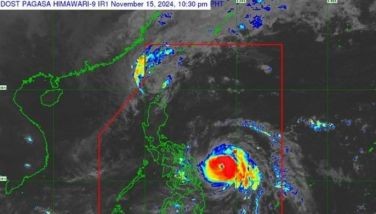China tamps down South China Sea talk at summits
China opposes raising its maritime disputes at international meetings, including the G-20 summit that ended yesterday in Hangzhou and subsequent meetings of Southeast Asian leaders and their partners in Laos.
To Beijing’s pleasure, President Duterte said he will not raise the subject of China’s compliance with an international tribunal’s ruling that invalidated Beijing’s territorial claims in the South China Sea. Preferring a quiet diplomacy, Duterte last month sent his special envoy, former president Fidel Ramos, to meet with Chinese officials and they agreed on the need to reduce tensions through talks.
“We will not raise hell now because of the judgment, but there will come a time that we have to do some reckoning about this,” Duterte said.
He said the Philippines can take only so much, with China insisting it owns the contested islands and refusing to recognize the arbitration ruling. “You cannot be slapped everyday with those kinds of words,” Duterte said.
China has relied on its ally Cambodia to block any overt mention of tensions in the South China Sea in communiqués following meetings of the Association of Southeast Asian Nations, because it doesn’t want to be confronted by a united bloc.
US President Barack Obama was more forthcoming in expressing his concerns over China’s behavior. He said ahead of his meeting with Chinese President Xi Jinping in Hangzhou that the US has been “very firm” in response to Chinese military assertiveness.
“We’ve indicated to them that there will be consequences,” he told CNN.
Xi told Obama that China will continue to “unswervingly safeguard” its territorial sovereignty and maritime rights and interests in the South China Sea, according to state-run Xinhua news agency.
Beijing’s next big move
There has been speculation that China might make even more assertive moves in the South China Sea after the G-20 meeting, including possibly launching reclamation projects in new areas or declaring an air defense identification zone over the crucial waterbody.
Duterte said the Philippine coast guard had observed Chinese barges at Panatag (Scarborough) Shoal, a tiny reef China seized from the Philippines in 2012. The vessels may indicate that Beijing is planning new construction that could ratchet up tensions.
Michael Green, a senior vice president at the Center for Strategic and International Studies, said building at Scarborough Shoal before the G-20 or the US presidential election in November would be “very self-defeating” for Beijing.
China also plans joint naval exercises with Russia in the South China Sea Sept. 11-19, a move criticized by the US as harming regional stability.
According to the Russian government’s Tass news agency, warships from Russia’s Pacific Fleet, including the anti-submarine vessels Admiral Tributs and Admiral Vinogradov, will take part.
Australian involvement
US Army assistant chief of staff Col. Tom Hanson urged Australia to take a stronger position against China’s assertiveness in the South China Sea.
“It’s very difficult to walk this fine line between balancing the alliance with the United States and the economic engagement with China,” Hanson told Australia’s Radio National. “At some point there is going to have to be a decision about which one becomes more of a vital national interest for Australia, in my opinion.”
Hanson wrote an opinion piece for the Australian Security and Policy Institute in May in which he argued for a “more visible and unqualified stance against Chinese territorial aggrandizement.”
- Latest
- Trending
































